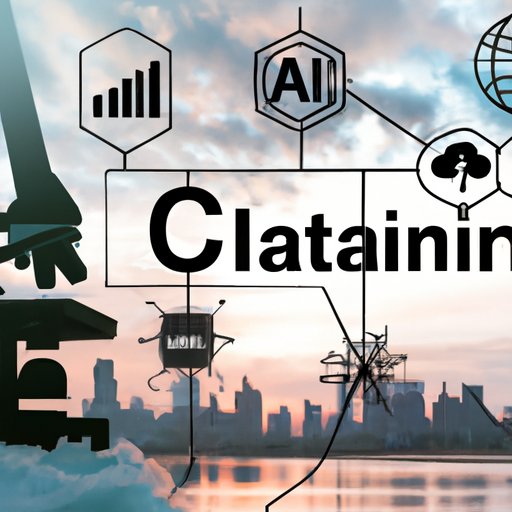Introduction
Climate change is one of the most pressing issues facing humanity today. The effects of global warming are increasingly being felt around the world, from more frequent and intense extreme weather events, to rising sea levels, to the loss of biodiversity. In order to address this crisis, it is essential that we find effective solutions to mitigate its impacts and adapt to its effects. Artificial intelligence (AI) technology has been proposed as a possible solution to these problems, and it can play an important role in helping us combat climate change.

Examining AI Technology and How It Can Combat Climate Change
AI technology is quickly becoming an integral part of many aspects of society, from healthcare to finance to transportation. As our understanding of AI technology advances, more and more applications for AI have been proposed to help us address the challenges posed by climate change. Here are some of the ways AI can be used to fight climate change:
Looking at AI-Driven Solutions for Adapting to Climate Change
AI-driven solutions can be used to help us better understand and adapt to the changing climate. For example, AI can be used to analyze data on climate change and provide insights into the future impacts of climate change. AI can also be used to develop models to predict extreme weather events and other climate-related phenomena, such as floods or droughts. AI can also be used to monitor the environment and detect changes in temperature, humidity, and other factors that could be used to predict the onset of extreme weather events.
Investigating the Potential of AI to Predict or Help Mitigate Natural Disasters
Natural disasters, such as floods and hurricanes, are becoming more frequent and more severe due to climate change. AI technology can be used to detect and predict these disasters, allowing us to take preventative measures to reduce their severity. AI-based systems can also be used to monitor the environment and detect any changes in atmospheric conditions that could indicate the onset of a natural disaster. Additionally, AI can be used to analyze data from past disasters and identify patterns that could help us better prepare for future disasters.
Analysing the Impacts of AI on Reducing Carbon Emissions
AI can also be used to reduce carbon emissions by improving energy efficiency. AI can be used to optimize energy use in buildings, factories, and other facilities, reducing their energy consumption and associated carbon emissions. AI can also be used to develop renewable energy sources, such as solar and wind power, which can help reduce our reliance on fossil fuels and decrease overall carbon emissions.
Exploring the Role of AI in Sustainable Development Goals
The United Nations’ Sustainable Development Goals (SDGs) are a set of international objectives designed to promote economic development and environmental protection. AI technology can be used to help countries meet the SDGs, including those related to climate change. AI can be used to improve agricultural production, making it more efficient and sustainable. AI can also be used to monitor and analyze data on air and water pollution, which can help us identify sources of pollution and take steps to reduce them.
Assessing the Challenges of Using AI in Addressing Climate Change
Despite the potential benefits of using AI to address climate change, there are still some challenges that must be addressed. First, AI technology is still developing, and it is not yet capable of providing reliable solutions for all climate-related problems. Additionally, AI requires large amounts of data to function effectively, and there may not be enough available data to accurately model climate-related phenomena. Finally, AI technology is expensive, which can limit its use in developing countries.
Understanding the Benefits of AI in Meeting the SDGs
Despite these challenges, AI technology still has the potential to provide a range of benefits to help countries meet the SDGs. AI systems can be used to monitor the environment, identify sources of pollution, and develop strategies to reduce emissions. AI can also be used to analyze data on climate change and make predictions about future impacts. Additionally, AI can be used to develop renewable energy sources and improve energy efficiency, which can help reduce our reliance on fossil fuels and decrease overall carbon emissions.
Conclusion
In conclusion, AI technology can play an important role in combating climate change. AI systems can be used to monitor the environment, predict extreme weather events, and reduce carbon emissions. Additionally, AI can be used to help countries meet the SDGs, including those related to climate change. While there are still some challenges with using AI technology, its potential to help us adapt to and mitigate the impacts of climate change cannot be denied.
Summary of AI’s Role in Combating Climate Change
AI technology has the potential to play an important role in combating climate change. AI systems can be used to monitor the environment, predict extreme weather events, reduce carbon emissions, and help countries meet the SDGs. While there are still some challenges with using AI technology, its potential to help us adapt to and mitigate the impacts of climate change cannot be denied.
Final Thoughts on AI-Driven Solutions For Adaptation to Climate Change
AI technology offers a promising solution to the challenge of climate change. By leveraging AI technology, we can gain a better understanding of the impacts of climate change, develop strategies to mitigate its effects, and help countries meet the SDGs. AI technology can thus be a powerful tool in the fight against climate change.
(Note: Is this article not meeting your expectations? Do you have knowledge or insights to share? Unlock new opportunities and expand your reach by joining our authors team. Click Registration to join us and share your expertise with our readers.)
